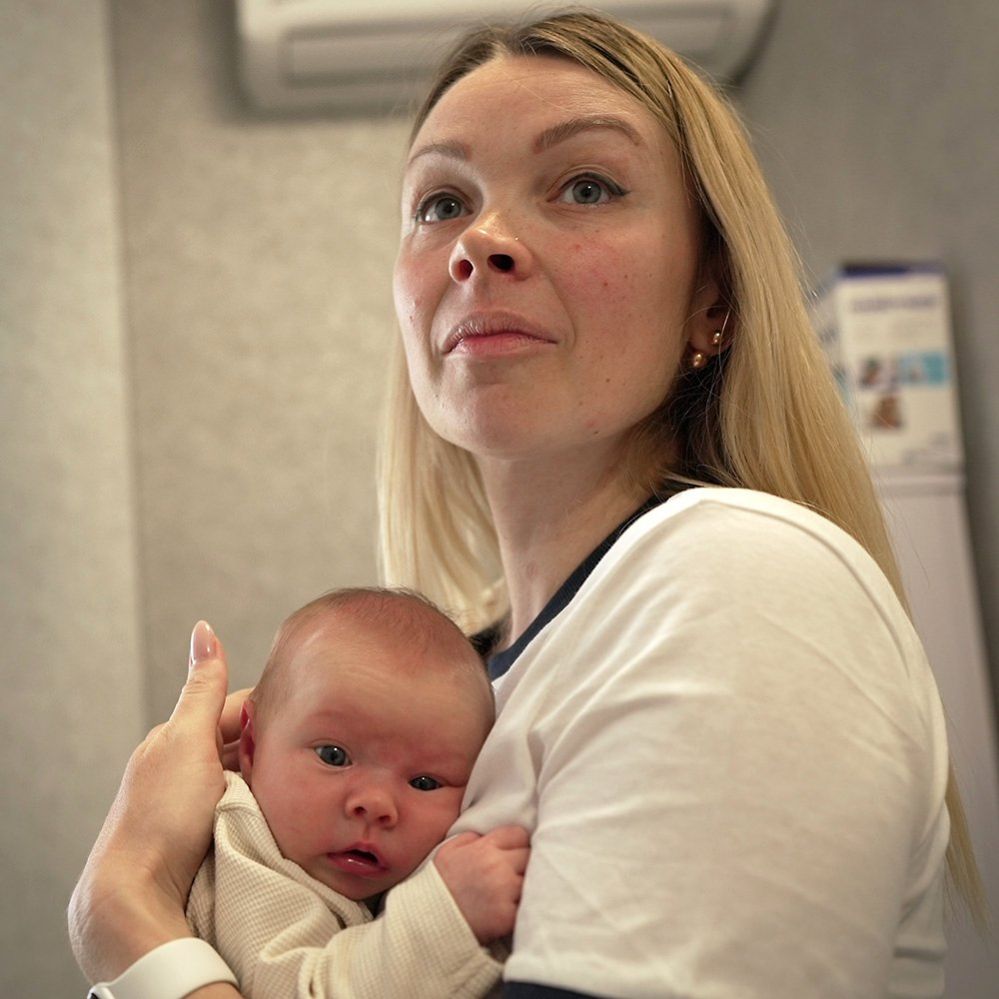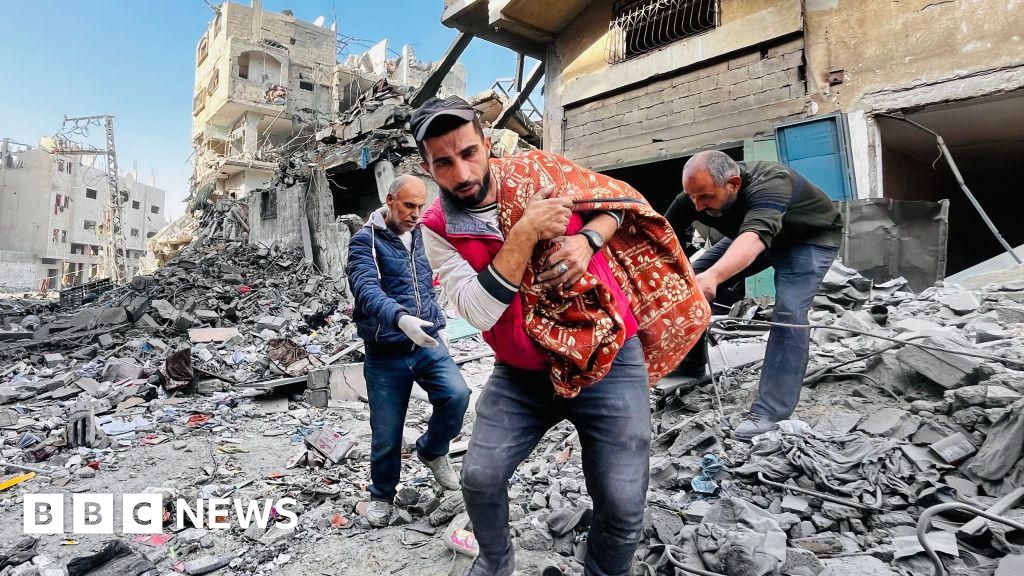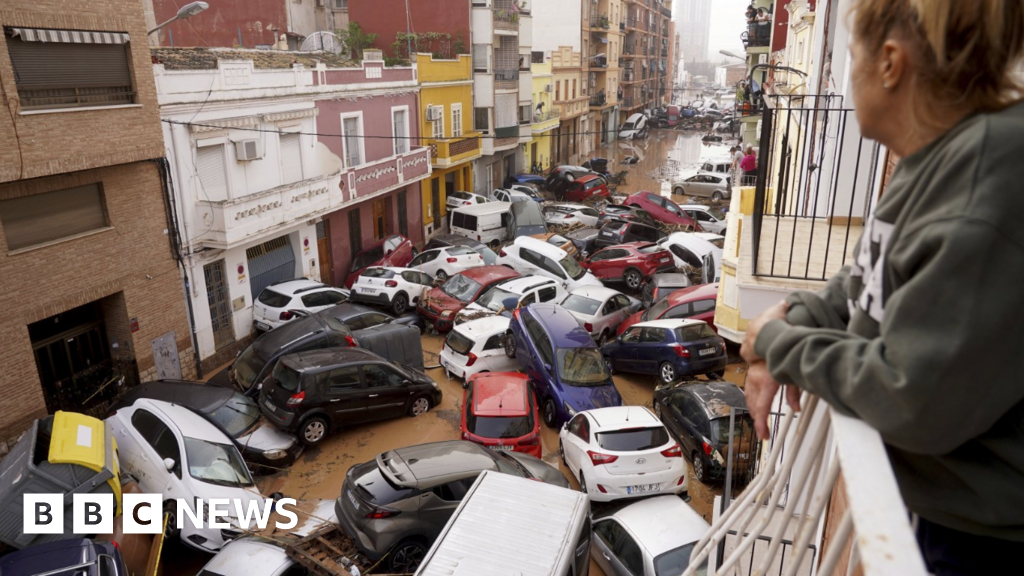ARTICLE AD BOX
 Image source, Ivan Iermakov/BBC
Image source, Ivan Iermakov/BBC
Yuliya Balahura's baby daughter, Mia, spent her first night in a hospital bomb shelter
By Zhanna Bezpiatchuk
BBC Ukrainian
"It's a daily thing for me to get up at 02:00, breastfeed Mia, and then air-raid sirens go off," says Yuliya Balahura, cradling her baby daughter at a medical centre in her hometown of Bucha, just outside Ukraine's capital.
Yuliya, 38, is now back home, but early in the summer she travelled about 30km (18 miles) to give birth to Mia at a hospital in Kyiv, as Bucha has no maternity hospital.
She went into labour just as Russia began bombarding the Ukrainian capital with missiles and drones almost every night.
Baby Mia spent her first night in the hospital's underground bomb shelter, just metres away from other women in labour or giving birth.
Ear-splitting sirens and explosions pierced the darkness, Yuliya says, but nurses encouraged women to stay calm and did their best to support them.
Image source, Getty Images
Image caption,Maternity hospitals in Kyiv moved patients into bomb shelters in the early days of the war
The Russian attacks have often caused power outages across the country and cut off water and heating supplies, making it difficult to provide adequate maternity care.
Yuliya, who already has two daughters, says she knew that going ahead with another pregnancy during a war would come with additional risks.
"You just get more hardened. You get used to attacks and constant air raids. You get stronger," she says.
In August President Volodymyr Zelensky confirmed Ukraine would draft more troops in the coming months, and Yuliya's husband, Vladyslav, expects to be called up soon.
Babies postponed
It's estimated that the country's birth rate has sunk by almost a third since the start of the conflict.
Just over 38,000 fewer babies were born in the country in the first half of this year compared with the same period in 2021 - before Russia's full-scale invasion - according to Ukrainian analytics firm Opendatabot, which bases its figure on births registered by Ukraine's Justice Ministry.
Even before the war Ukraine's birth rate was dropping, but this conflict has separated families, forcing them to postpone plans to have children.
Hundreds of thousands of men have enlisted or been drafted to fight, and an unknown number have died. Some young women have also volunteered, while three to four million have been forced to flee to countries like Poland, Germany and the UK.
"Some of these women could have given birth this year but won't. After the end of the war, they might return to Ukraine or not. Maybe their husbands will join them abroad. Some families may break up," says Oleksandr Hladun, deputy director of the Ptoukha Institute for Demography and Social Studies in Kyiv.
BBC
Life shouldn't stop, even now we need to move on
Baby Mia's doctor, Natalya Stolynets, says that before the invasion she used to register 10 newborns a month on average in her district in Bucha, a satellite town of Kyiv where hundreds of murdered civilians were found when Russia's five-week occupation came to an end. Now if she gets one or two newborns in a month she sees it as a sign of hope.
"Life shouldn't stop, even now we need to move on," she says.
Young Ukrainian mums understand that giving birth in a time of war means spending nights huddled in bomb shelters, Natalya says, but some remain adamant not to let the invasion "steal their life and chance for motherhood".
No ideal time
Halya Rudyk and her husband Kostia Nechyporenko are both working journalists in Ukraine, and have recently become parents.
"When, if not now?" asks Halya. "It didn't make sense to wait for some better time."
Even if the war ends tomorrow, she says, its effects will last for years, as the country slowly rebuilds.
"We don't know if we will have jobs or how it's going to be in the future," she says. "Also, I felt angry that Russia is trying to steal from us the best time of our life."
The couple's daughter Maria is just three days older than Mia, and was also born in Kyiv amid air raids and missile strikes.
Kostia, who is waiting for his draft papers, says he could be called up by the Ukrainian army at any time and he wants to start his family now rather than wait.
"I realised that I won't be young forever," he says. "There will be no ideal time for raising children for us, as a Ukrainian couple, in the next five or six years."
Image source, Ivan Iermakov/BBC
Image caption,Halya Rudyk says it didn't make sense to wait to become parents
Not everyone feels the same.
Iryna Melnychenko, a 35-year-old writer who lives in Kyiv, says she and her husband decided to postpone having a baby for at least a year after he was called up to fight.
The couple were married just three weeks before the war began and dreamt of starting a family and having their own home, Iryna says.
"When my husband went to the front line, I felt so sorry that I was not pregnant and wouldn't have his child to love and care for.
"Then I realised that a pregnancy in wartime with a husband on the front line meant that I could end up as a single mother."
Back in Bucha, Yuliya strolls through her neighbourhood every day with Mia in a pram and her middle daughter, Rimma, walking alongside her. Continuing with normal life is a way of defying the war.
She hopes that, for her daughters, the war will soon be a distant memory, and says it is up to the adults to make Ukraine a safe place for families again.

 1 year ago
13
1 year ago
13








 English (US)
English (US)